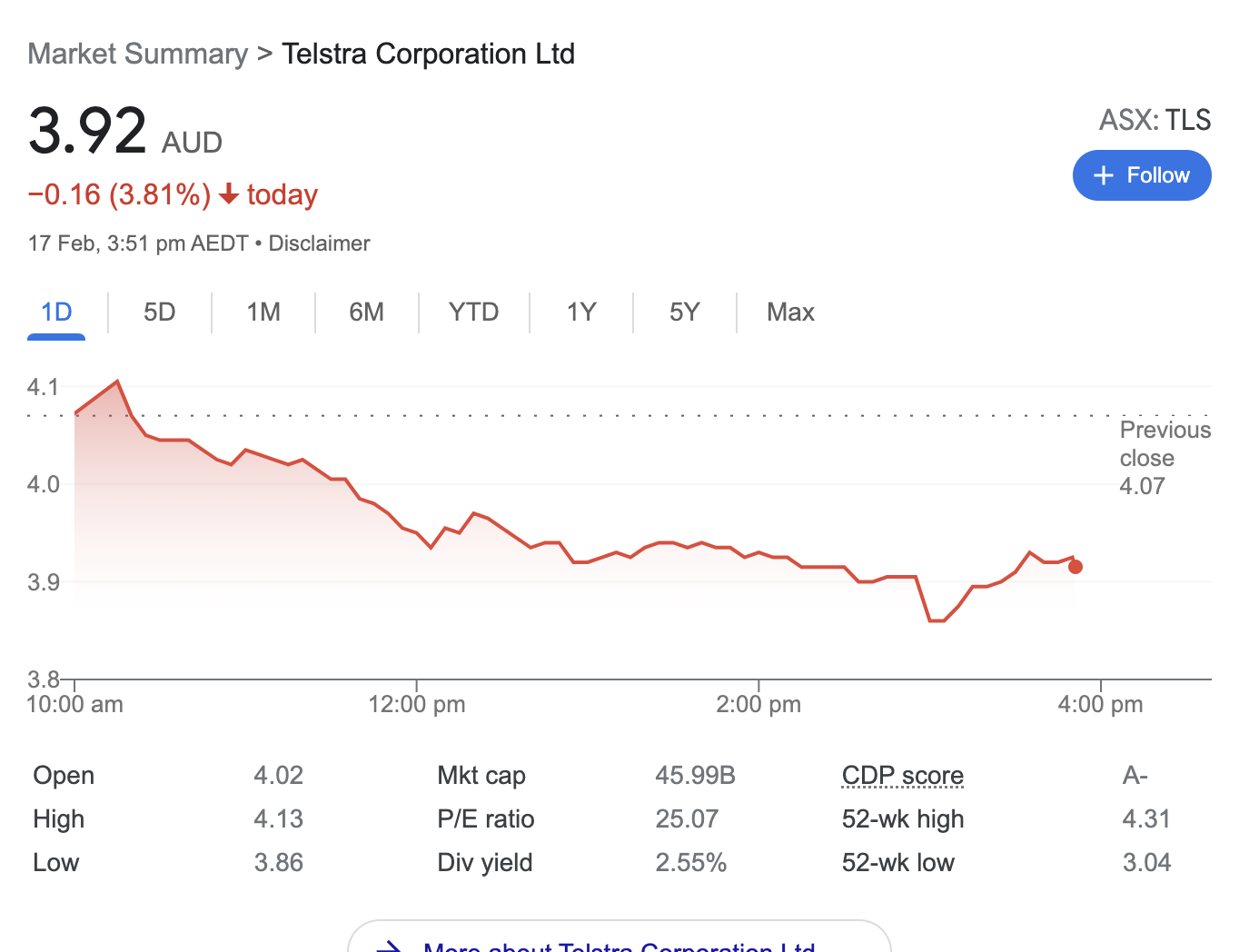"We're surprised": Telstra slides after reporting underlying growth, mobile success

What happens when a telco behemoth delivers 5.1% underlying EBITDA, grows its mobile business considerably, reduces costs by 6.7%, maintains its interim 8 cents per share dividend, and reaffirms its 2022 outlook? Well, obviously its shares slide. Obviously.
That at any rate is what happened on the ASX after Telstra reported Thursday
Below is a snapshot of trading at 4PM reporting day.

There were other factors of course: Revenue was down 4.4% to $10.5 billion and reported EBITDA was down 14.8% to $3.5 billion.
But to make sense of the report, not least to help us decide if we saw a market overreaction, underreaction, or somewhere in between, and to discuss the key takeaways and the course ahead, we went to Daniel Moore, Portfolio manager at Investors Mutual Limited.
We also asked whether Daniel would buy hold or sell Telstra on the back of their result.
- Underlying EBITDA up 5.1%
- Mobile division ARPU up 5% with guidance for mid-single-digit revenue growth to continue to 2025.
- Interim dividend maintained at 8 cents a share
- Operating expenses down 6.7% to $7.4 billion
- FY 2022 guidance restated
- Revenue down 4.4% to $10.5 billion
- Reported EBITDA down 14.8% to $3.5 billion
What were the key takeaways from Telstra's report?
After several years of earnings decline, you know, the underlying business has returned to growth, with EBITDA up 5%.
The mobile division was the standout result where EBITDA grew 25% and they achieved that by increasing ARPU (average revenue per unit) by 5% - or increasing price by 5%, as well as adding subscribers, which is a great outcome.
When you increase the price, that has a big effect on the bottom line. And if you look at the subscriber increases a lot were Telstra-branded subscribers - about 60,000. That was a good result.
Also, Telstra's been delivering some pretty solid cost-cutting now for a period of time. They've had to, with the multi-billion dollar NBN headwinds.
On the negative side, the consumer broadband business, which is the business that resells the NBN was, was a bit weaker. They're subsequently backwards, slightly. And the margin outlook for that business is a little bit worse than expected, but overall they maintained guidance.
What do you make of the market reaction? By 4PM it had tumbled nearly 4%.
It's a solid result that is generally in line with expectations.
But if you look at the composition, the composition of the earnings is strong. The better quality divisions such as mobile outperformed and probably the lower quality, less valuable divisions like NBN reselling probably underperformed.
So from our perspective, we're surprised by the drop in the share price.
Were there any major surprises in the result that you think investors should be aware of?
I think the leverage to the bottom line of mobile, I think was probably the biggest surprise.
I think everyone was expecting some ARPU growth and some subscriber growth, but the leverage they had to the bottom line with EBITDA increasing 25% again was a very strong result.
What's encouraging is Telstra actually gave guidance that they expect the mid-single-digit revenue growth that they're achieving in mobile to continue to 2025. That provides a really good outlook for the company.
Would you buy, hold, or sell Telstra
It's a buy for us. The company's weathered $3.4 billion of NBN headwinds over the past few years. But they are all behind them.
And then if we look going forward, the mobile division, we expect it to deliver really good growth over the next two to three years.
The business also owns a number of underappreciated, high-quality infrastructure assets, particularly the NBN rental business where they rent the ducts and pipes to the NBN, which is a billion-dollar revenue stream, which is linked to CPI.
What are your expectations and outlook for the company, and the telco industry more broadly?
Look, I think the outlook's good for all the players in the industry. The industry has had a very tough competitive period of mobile pricing really up until about six months ago.
We saw industry profitability really collapse to the stage where Optus and Vodafone weren't making money. We're at pretty early stages in that profit recovery or profit repair period.
The returns of the industry are still very low and they need to spend a lot of CapEx in rolling out their 5G network. So the outlook for mobile looks strong for the whole industry over the next few years as we get some more rational competition.
And also for the mobile industry, the other big positive is international roaming will return. Telstra thinks that's about $200 million of extra revenues they'll get when we finally get international travellers back to the country.
Do you see Telstra leading the Telco pack?
Yes. Telstra, because it's got the best brand, they've probably got the best ability to raise prices.
And the other really important point is Telstra actually over the past few years has migrated over 80% of their customers to their new mobile plans, which are what they call in-market plans, which means the pricing is live.
If Telstra does choose to put prices up to offset any inflationary pressures, that will fall to the bottom line straight away, as opposed to the older school contracts which have a two-year length - so if you were to put up a price across your board, it would take two or three years for that to feed through.
But Telstra is in a really good position if they need to lift prices and for that to fall to the bottom line quite quickly.
4 topics
2 stocks mentioned
1 contributor mentioned

Matt Buchanan is a former Head of Content at Livewire Markets. Matt is an avid investor and a big fan of the Livewire community, which he first joined in 2017.
Expertise

Matt Buchanan is a former Head of Content at Livewire Markets. Matt is an avid investor and a big fan of the Livewire community, which he first joined in 2017.

